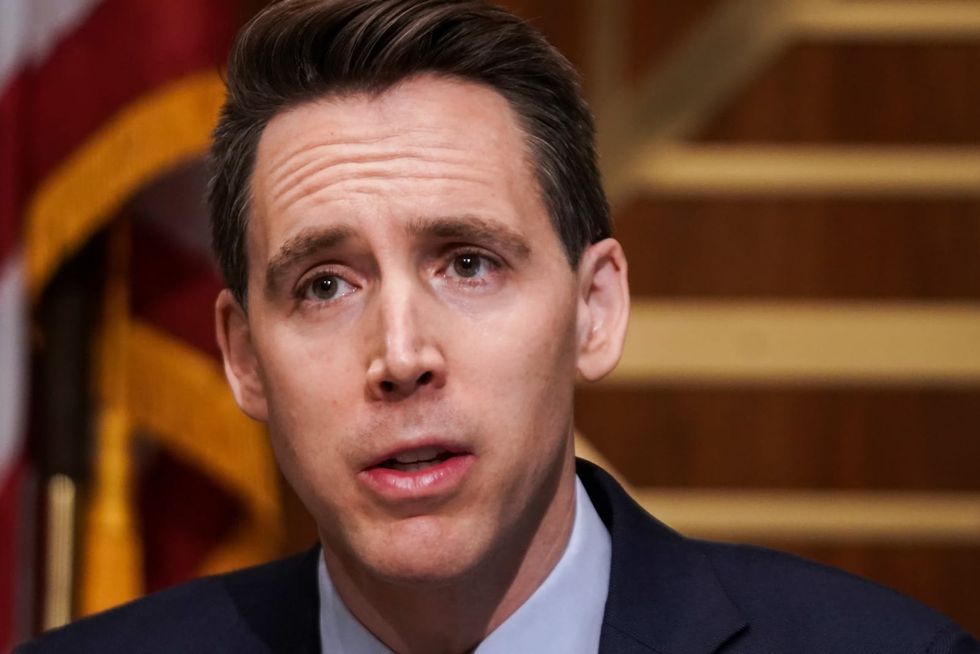'Disastrous': Top Dems marvel at 'irony' of Trump dragging US into war
A senior Democratic senator marveled at the “irony” of President Donald Trump seeming set to lead the United States into another Middle Eastern war, as he mulls joining Israel in striking Iran despite having won two elections with promises of an isolationist, “America First” foreign policy.
“What an irony it would be if Donald Trump dragged us into another Middle East war,” Sen. Chris Murphy (D-CT) told reporters at the Capitol.
“That's clearly not anything the American people want.”
Widely held to harbor presidential ambitions, Murphy is a prominent Democratic voice on Capitol Hill, sitting on the Senate Foreign Relations Committee.
“Common sense would tell us there is a significant and perhaps certain risk of escalation, including targets on U.S. forces in the region that would be a … potentially disastrous outcome for the United States,” Murphy said.
“So I still don't believe the United States should get involved here, and I don't think I would be supporting Congress to authorize it. The president doesn't have the ability to authorize a strike without congressional authorization — [that] is probably the most important thing here.”
Another prominent Democrat, Sen. Tim Kaine (D-VA), has introduced a resolution to force Trump to seek congressional approval for strikes on Iran.
Kaine, who sits on the Senate Armed Services and Foreign Relations committees and was his party’s vice-presidential nominee in 2016, pointed to polling showing scant support for military action.
“I saw yesterday, 60% of Americans do not think we should be at war with Iran, 16% say yes, 24% say they're not sure,” Kaine told reporters.
“That is consistent with what I'm hearing in Virginia, a very pro-military state, that it would be a very bad idea for us to be in another war in the Middle East.”
‘I may do it, I may not’
Five days after Israel launched strikes on Iran, killing top leaders, and Tehran answered with strikes of its own, the conflict shows no sign of slowing.
Trump is still mulling what to do.
On Wednesday, with Congress abuzz with talk of his intentions, the president did not make things clear.
“I may do it, I may not do it,” he told reporters at the White House, when asked if he would order an attack on Iranian nuclear facilities.
“I mean, nobody knows what I’m going to do. I can tell you this, that Iran’s got a lot of trouble. And they want to negotiate. And I say, why didn’t you negotiate with me before all this death and destruction.”
Trump also attacked a CNN reporter who noted, “some of your supporters are split on the U.S. response”.
Kaine told reporters his speech introducing his resolution prompted “a lot of military members and military families” to reach out to his office.
According to Kaine, such callers said: “Thank God somebody is trying to make Congress think about this, and do you really want to go back into another war in the Middle East?”
Kaine brushed off questions about Trump’s apparent split from his director of national intelligence, the former Democratic congresswoman Tulsi Gabbard, who has said Iran is not close to a nuclear weapon.
“He can say whatever he wants about his own staff,” Kaine said.
But he added: “I will say, and this has been publicly reported again and again and again, that Iran's nuclear enrichment activities were under control during the JCPOA,” the Iran nuclear deal signed under President Barack Obama in 2015.
“When Donald Trump tore it up [in 2018], they started to move ahead on centrifuges and enrichment.
“However, the intel community has consistently said they see no evidence that there's been a decision to turn that into a nuclear weapon. And that's basically what [Gabbard] was saying. That's been consistent for years.”
‘Bamboozled’
On the other side of the aisle, Sen. James Risch (R-ID), chair of the Senate Foreign Relations Committee and a member of the Intelligence Committee, disagreed with Kaine.
“I've sat across the table from [Israeli prime minister Benjamin] Netanyahu off and on for the last 17 years, and he has been incredibly frustrated with Iran refusing to give up its nuclear ambitions,” Risch said.
“The Obama administration tried, they got bamboozled. They wound up with a really bad deal, and we're in a worse place now than if we hadn't had that deal in the first place.
“I think that the Israelis have finally had it and said, ‘Look, this is an existential question for us. We're going to do something about it. That's their decision.’
Risch indicated an expectation that all Iran’s nuclear sites will be destroyed, whether by Israel or the U.S., despite widespread analysis that only the U.S. can do so.
“I sit on the Intelligence Committee so I have to be careful what I say here,” Risch told a reporter.
“But I am not willing to accept your proposition or your premise that you ask that question on, that [Israel’s] not going to be able to finish the job on the three nuclear sites that Iran has.”
Referring to an Iranian facility hidden under a mountain, the reporter asked: “Including Fordow?”
“You heard my answer to your question,” Risch said.
There is Republican opposition to Iran strikes — including from the populist conservative Sen. Josh Hawley (R-MO) — but there are plenty of hawks.
Sen. Kevin Cramer (R-SD), a member of the Armed Forces and Veterans Affairs committees, said he would back Trump.
“One of the things I've been trying to resist is speculating what Donald Trump is thinking,” Cramer told reporters, before flirting with speculation over “the movement of tankers and Navy ships and … fleets,” then saying again he did not want to “speculate in terms of an offensive attack.”
“That said,” Cramer added, “I will support whatever he decides to include, if he decides to drop bunker-busters on Fordow and finish, once and for all, the getting rid of any nuclear capability by this regime.”



 Supreme Court 2022, Image via Fred Schilling, Collection of the Supreme Court of the United States
Supreme Court 2022, Image via Fred Schilling, Collection of the Supreme Court of the United States
 Sen. Josh Hawley (R-MO). (Nash Greg/TNS)
Sen. Josh Hawley (R-MO). (Nash Greg/TNS)